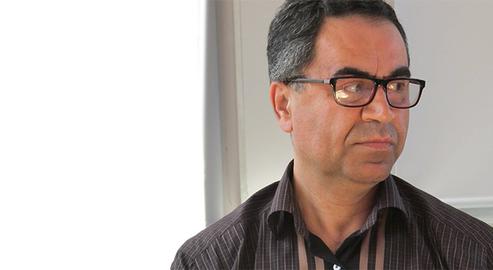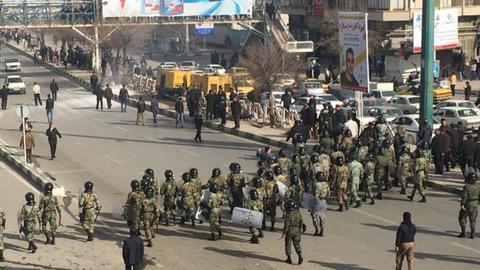Spontaneous protests over rising prices, corruption and costly involvement in regional conflicts (such as those in Syria and Iraq) erupted in Mashhad, one of the holiest places in Shia Islam, and Iran’s second largest city, on Thursday, December 28. The protests quickly spread to other major cities across Iran including Isfahan, Karaj, Ahvaz, Rasht, Sari, Qazvin and Kermanshah. Some protesters went so far as to shout “Death to the dictator!” — referring to Iran’s Supreme Leader Ali Khamenei.
In some cities, like Mashhad and Kermanshah, the protests turned violent when the police tried to disperse the demonstrations. Reports indicate that an unknown number of protesters – but perhaps about 50 in Mashhad – have been arrested. And about 300 demonstrators gathered in Kermanshah after what the semi-official Fars news agency, affiliated with the Revolutionary Guards, characterized as “a call by the counter-revolution” and shouted “Political prisoners should be freed” and “Freedom or Death!”, while destroying public property.
This is the largest wave of protests in Iran since the aftermath of the disputed 2009 presidential election. But this time the protests were not political, at least not when they started. The Iranian currency has fallen to record lows against the US dollar, unemployment is high and inflation is rampant. Many are also unhappy with the high financial cost of Iran’s involvement in regional conflicts.
Most Iranians received news of the demonstrations via Telegram channels. The social media platform, with more than 20 million users, is one of the most popular messaging apps in Iran. It was even said that the protests in Mashhad were first reported by Telegram channels run by the Basij, a paramilitary vigilante organization associated with the Revolutionary Guards.
When the demonstrations started, Eshagh Jahangiri, Rouhani’s First Vice President, was in the city for a visit. In reaction to the protest, he said that “all the economic indicators are good even if a couple of commodities have become a bit expensive.” He claimed that economic issues were being “used as an excuse” by the protest organizers, and warned against the dangers of the protests spreading.
But soon the slogans went beyond than economic malaise. “Reza Shah, rest in peace,” some protesters shouted, in praise of Reza Shah (1878-1944), the 20th-century modernizer king and founder of the Pahlavi dynasty that was overthrown by the 1979 Islamic Revolution.
Do as China Does!
The first official reaction to the protests came from Ahmad Alamolhoda, the Supreme Leader’s representative in Mashhad; importantly, Mashhad is a power base for Alamolhoda’s son-in-law Ebrahim Raeesi, the unsuccessful candidate who ran against Hassan Rouhani in the 2017 presidential election.
“Some people gathered to express their demands,” said Alamolhoda, “but suddenly a small group — not more than 50 — joined this crowd and hundreds started chanting the deviant slogan of ‘Forget about Palestine’ and ‘No Gaza, No Lebanon; I will give my life for Iran.’”
The slogans, of course, were not limited to this. Other slogans included “Death to the dictator”, “Death to Rouhani”, “Our country is a house of thieves, peerless in the world”, “This is the day of mourning; our rights are prisoners of the mullah’s cloaks”, “You stand on Islam to make people miserable”, “We die but we will get Iran back”, “People are paupers while the Master [Khamenei] lives like a god”, “Have shame, you mullah; let go of our country” and “O Shah, rest in peace.” These slogans traveled across the country instantly through social networks.
The role of the internet and social networks in coordinating the protesters’ slogans prompted Movahedi Kermani, Tehran’s Friday Prayers Leader, to say during his sermon yesterday that Iran must imitate China and block the internet to prevent protests.
“China had the [right] idea about the dirty environment in cyberspace,” he said. “It uses a filter so that no thought that goes against China’s system enters people’s minds.”
But Mahmoud Sadeghi, a reformist member of parliament from Tehran, tweeted that even if people’s protests were organized, “government authorities must remain accountable. We must not resort to conspiracy theories instead of being responsible. Marching without bearing arms is a fundamental right of the people.”
Not Unexpected
There are those who do not find this wave of protests particularly surprising. One is Jamshid Asadi, a professor of economics in Paris who points to the sharp drop in people’s purchasing power and the high unemployment rate.
“On one hand,” he says, “people either do not get paid or receive their retirement pensions with delay. On the other hand, the cost of living has been going up, and even if people receive their salaries on time it would not keep pace with the sharp rise in the cost of living. Rouhani’s budget for next year predicts that the cost [of living] will continue to rise. It is clear that people are unable to meet their costs of living and the poverty line is going up.”
On social networks some have named the protests the “Movement of the Hungry” and Asadi says that “it is clear what people want in these uprisings. All of them might not be hungry but they are financially poor, meaning they are deprived of what it takes to have decent lives.” He points to recent labor unrests among sugar refinery workers, bus drivers and workers in other sectors. And while people have not so far risen against this situation, “now it has reached a new level, where unemployment among college graduates is so high that it means the middle class does not exist.”
In the short term, Asadi says, the Iranian state and government have no answers to people’s demands. The economy, which he says “imploded” with Ahmadinejad, has led to a situation that leaves the government no choice but “repression.”
“Ahmadinejad had some money and distributed it around,” Asadi says. “He was able to create an illusion [of prosperity] for a while, but the present government does not have even this choice. It has even been unable to accomplish investments that it had promised for its first 100 days, especially with all the money that Iran is spending on its involvement in other countries. So it has no choice but repression in the face of the people’s discontent and their uprising.”
Preparing for Repression
The reformist journalist Reza Alijani who now lives in Paris holds similar views. He believes that the Islamic Republic is unable to improve economic conditions even if it wants to.
“Some time ago the Revolutionary Guards announced that it was planning to take over the security of the cities to deal with robberies and thugs,” he says. “But this was just a lie and a deceptive excuse. Based on their own political and security analyses they had predicted that economic discontent might lead to uprisings. The regime has been preparing itself for repression.”
Alijani believes that although economic discontent has always resulted in uprisings and strikes, the chain reaction due to rising prices and unemployment is new because of the depth of economic unhappiness. “And the proposed budget has made people even angrier,” he adds.
Drawing on news reports and hearsay, Alijani says that some people, including members of the Basij Organization, want to exploit the situation against Rouhani’s government. But he says that they are playing with the “tiger’s tail” – and “if they do not play it right they will be confronted with the ire of the whole regime and will pay the price. But, no matter what, the rulers must understand that people are unhappy with the economic conditions resulting not only from domestic policies but also from the foreign policies that are not controlled by Rouhani but by General Soleimani [commander of the expeditionary Qods Force fighting in Iraq and Syria] and Ayatollah Khamenei. People are unhappy with Iran’s spendthrift policies in the Middle East. The blame would not fall only on Rouhani’s government but on the whole regime."
Playing with Gunpowder
Reza Alijani finds it “suspicious” that the protests against the government and President Rouhani started in Mashhad, Ebrahim Raeesi’s powerbase. “We have seen this before,” he says. “When the Shah did not like a prime minister his court and SAVAK [the Shah’s secret police] lit a fire to show that the administration was incompetent. But what happened in Mashhad is setting a match to a gunpowder store that neither those who lighted the match nor the government has any control over. This gunpowder store is the people’s rightful complaints about the entire regime’s helplessness and inability to deal with complex economic issues. If Mr Khamenei says that people who have controlled the government in the past 10 years must be held accountable then he himself and the institutions under his control must be held accountable, too. People who have held absolute power for three decades must answer to people’s protests over the economy.”
Alijani believes that if the protests continue the target of the protesters will become clearer.
“With the Green Movement [after the 2009 presidential election] the slogan ‘Where is my vote?’ changed to ‘Death to the Dictator!’” he says. “Protests over the economy can follow the same path. The Islamic Republic — both the elected and unelected branches — can only satisfy people by changing Iran’s foreign policy. In his first term, President Rouhani said that up until then the economy had subsidized politics but now it was time for politics to subsidize the economy. But is Ayatollah Khamenei ready to subsidize the economy for the people at the expense of policies that have incited the world and the region against Iran? Even if the Basij Organization has instigated the protests, the game would gradually place the ball in the court of Khamenei and his foreign policies.”
visit the accountability section
In this section of Iran Wire, you can contact the officials and launch your campaign for various problems



























comments